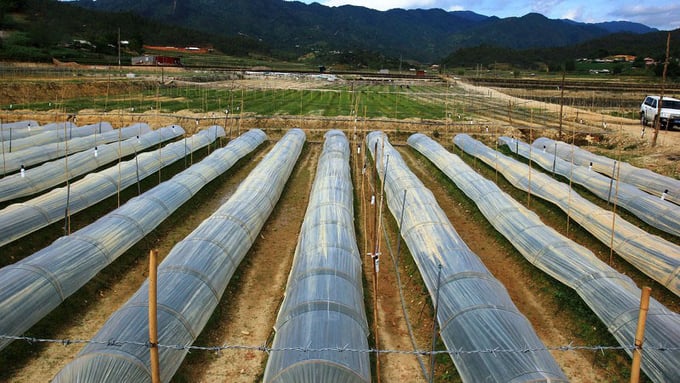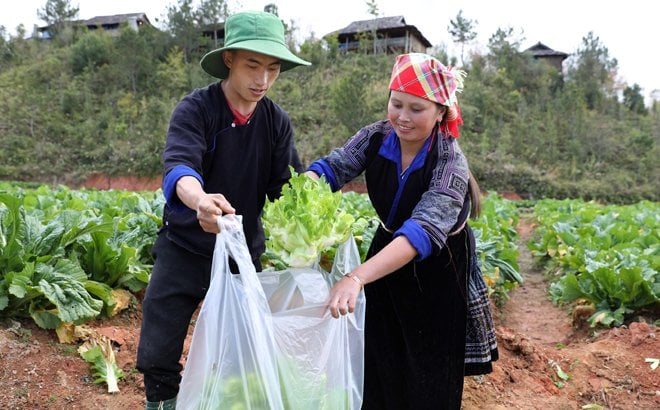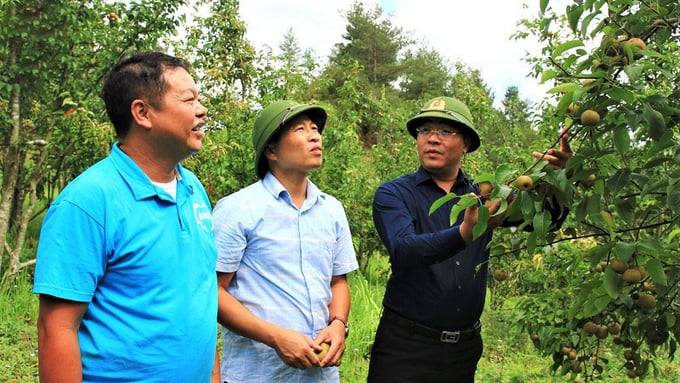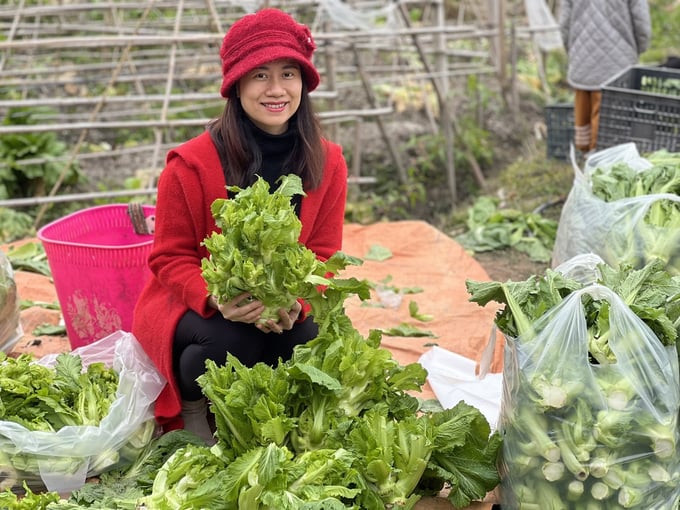November 26, 2025 | 11:47 GMT +7
November 26, 2025 | 11:47 GMT +7
Hotline: 0913.378.918
November 26, 2025 | 11:47 GMT +7
Hotline: 0913.378.918
Agricultural production in Mu Cang Chai highland district (Yen Bai province) always faces many difficulties in weather, climate, and soil conditions. This area has an average altitude of 900m and low temperatures, especially in winter, sometimes down to 0 degrees Celsius.
Every year, the impact of severe and harmful colds on agricultural production is enormous. Even snow and frost appear, causing damage to crops and livestock. Many areas of agricultural land cannot be produced in the winter due to a lack of irrigation water and cold weather.

Many vegetable growing areas in Mu Cang Chai must use plastic covers to protect against cold and frost. Photo: Thanh Tien.
In recent years, Mu Cang Chai district authorities have been actively testing and selecting several new crop varieties with high yield and quality, adapted to climate sub-regions with cold and dry winters to supplement the variety structure.
This is the third year that the Mu Cang Chai Edible and Medicinal Mushroom Production Cooperative (Cooperative) has switched to growing stone sprouts in Nam Khat commune with an area of 4 hectares. The appearance is quite similar to the kale plant, but the rock sprouts have large sheaths and many branches, with few leaves, so they look like a sprouting rock.

Stone sprouts grow well in cold winters, so they are suitable for planting in some communes of Mu Cang Chai district. Photo: Thanh Tien.
Up to now, members of the cooperative have firmly grasped the technical process of planting, caring for and harvesting. Each hectare of stone sprouts will yield a harvest of 30 tons/ha for 20,000 VND/kg, with a revenue of about VND 600 million/ha. This specialty vegetable is mainly sold in places like Hanoi, Lai Chau, Son La, Phu Tho...
Nam Khat commune is located at an altitude of 1,400m. The average annual temperature is 17-18 degrees Celsius. In winter, it is colder than other areas. Due to cold weather conditions, only one rice crop can be grown here, so hunger often occurs. The district's policy of converting appropriate crop structures to adapt to climate change has been applied using the Da Lat rose growing model. Roses can grow and develop well in low-temperature conditions from 8 - 25 degrees Celsius. Flower plants have large stems, fat flower buds, and beautiful colors. The commune has formed a rose-growing area of more than 40 hectares, creating jobs and regular income for hundreds of local workers.
In 2010, the Department of Science and Technology of Yen Bai province launched a pilot planting project of 1.5 hectares of Tai Nung pear variety originating from Taiwan in 2 communes of Pung Luong and De Xu Phinh (Mu Cang Chai), places with altitudes of 1,000 m or more. Practical and scientific results show that this pear variety overgrows and adapts to harsh climatic conditions in Mu Cang Chai. From about the 3rd year, flowering and fruiting begin. The Tai Nung pear area here has expanded to nearly 70 hectares.

After more than 10 years of experimental planting, the Tai Nung pear tree has grown to an area of nearly 70 hectares. Photo: Thanh Tien.
In addition to researching and testing the replication of new crop varieties, Mu Cang Chai district mobilizes people to apply scientific and technical advances to intensive farming to increase crop productivity. Implement crop restructuring, increase production, improve land use coefficient, gradually shift agricultural production towards commodity production, and increase people's income.
According to Mr. Sung A Chua - Vice Chairman of Mu Cang Chai District People's Committee, to adapt to climate change, the district has coordinated with functional branches to guide people in choosing and introducing new crop varieties and rice varieties, drought-resistant, cold-resistant, high-yield corn into production, mobilize people to produce according to the seasonal schedule and actively apply science and technology... Take advantage of the State's support policies to encourage people to change the form of small-scale livestock farming to commodity farming, free grazing to semi-free grazing. Enhance training and transfer of scientific and technical disease care and prevention advances, and proactively respond to harsh weather.
In addition, the district continues to research and test the introduction of cold-loving plant varieties suitable for climate and soil conditions and mobilize people to plant them to replace low-yield and low-quality plants. Thanks to that, Mu Cang Chai now has temperate fruit orchards that lose their leaves in winter, burst into buds, and flower and bear fruit in spring, such as: Crisp persimmon with more than 30 hectares; Tai Nung Pear, nearly 70 hectares; peaches and plums on 50 hectares.
Shallow fields lacking water for cultivation are converted to suitable crops such as roses, taro, potatoes, sweet potatoes, beans, mustard greens, and rock sprouts... These products also become a specialty product tourists favor whenever they come here.

Visitors to Mu Cang Chai are very fond of the dish of stone sprouts. Photo: Thanh Tien.
Many agricultural cooperatives with farmer members have been established in the area. They are gradually changing their production mindset depending on the weather, proactively applying scientific and technical advances such as vegetable production in greenhouses and net houses, advanced watering, and cultivating according to VietGAP and organic standards. Implement sustainable farming practices on sloping land to retain water and reduce erosion.
Adapting to climate change, harsh weather, and land characteristics is urgently required for the agricultural sector to develop in Mu Cang Chai highland district. The formation of cold-resistant vegetable gardens and temperate fruit gardens brings high income while minimizing the risk of natural disasters, contributing to building a modern and sustainable agricultural industry.
Translated by Tuan Huy
/2025/11/26/3627-4-082628_818.jpg)
(VAN) From a small café on the red basalt highlands, Le Van Hoang started a business with clean coffee, building Enjoi Coffee into a symbol of organic agriculture in the Lam Dong plateau.
/2025/11/25/0045-1-135246_13.jpg)
(VAN) Ca Mau is researching a model of sea-encroaching embankments combined with viaducts and logistics service zones, aiming both to prevent erosion and create land funds for marine economic development.

(VAN) The information was shared at the seminar 'Urban Agriculture - Solutions for Developing Green Spaces,' organized by the Kinh te & Do thi Newspaper and the Biotechnology Center of Ho Chi Minh City.
/2025/11/19/4141-2-132831_216.jpg)
(VAN) One of Japfa's outstanding solutions is implementing digital transformation and artificial intelligence (AI) to optimize operations, enhance productivity, and advance sustainable development.
/2025/11/19/4847-1-093540_448.jpg)
(VAN) The Gia Lai Provincial People’s Committee had a working session with the delegation of the U.S. Department of Agriculture, the State of Idaho, and representatives of the State's leading enterprises.

(VAN) Ca Mau has a sufficient foundation to become a strong regional aquaculture center, where production integrates the economy, the environment, and the lives of the people.

(VAN) SEIKI Group envisions itself as a pioneer in the ‘dual transformation’ of digital technology and green industry, standing alongside the Government and Vietnamese businesses in their pursuit of sustainable development.